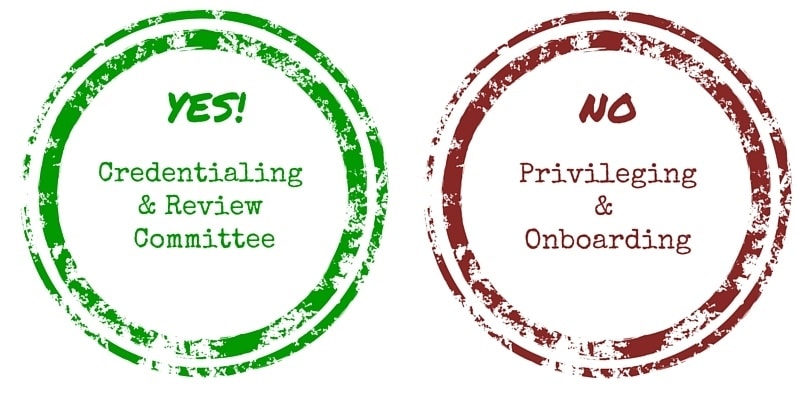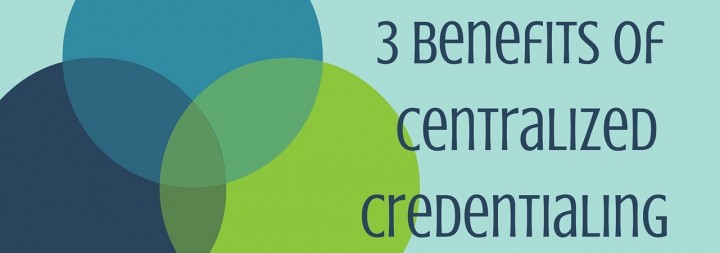Centralized credentialing can help eliminate repetitive work, improve revenue cycle, and lower credentialing costs for hospitals, facilities and practices. It also improves provider data integrity and facilitates delegation with payers. To take a deeper dive into the benefits of centralized credentialing, let’s take a moment to understand what centralizing means and what tasks should and should not be included in a centralized credentialing operation.
Centralized credentialing occurs when two or more hospitals or practices amalgamate their credentialing process—that is, their credentialing teams join forces. The hospitals share the cost of credentialing providers, and if a doctor works at both hospitals, she would only need to be credentialed once, not twice. Not only is this more efficient for facilities, it reduces the administrative burden for providers and increases goodwill between providers and administrators.
 We have found that centralizing the credentialing and the review committee can be extremely beneficial to hospitals and practices. However, centralizing onboarding and privileging often causes more stumbling blocks than benefits, and is not a prudent way to initiate a centralization process. For this reason, we recommend keeping the onboarding and privileging processes unique to each hospital, practice or facility—at least until the centralized process is stabilized.
We have found that centralizing the credentialing and the review committee can be extremely beneficial to hospitals and practices. However, centralizing onboarding and privileging often causes more stumbling blocks than benefits, and is not a prudent way to initiate a centralization process. For this reason, we recommend keeping the onboarding and privileging processes unique to each hospital, practice or facility—at least until the centralized process is stabilized.
Benefit 1: Eliminate redundant work
The New England Journal of Medicine estimates that the medical industry wastes a billion dollars each year due to lack of standardization and coordination of administrative policies and procedures. Without centralization, each hospital, practice and facility in a system performs the same credentialing tasks for each provider. These are what we call the core credentials—the steps that every hospital and facility has to go through in order to be compliant.
As mentioned above, we’ve found that there are diminishing returns when a medical staff office (MSO) centralizes functions beyond the core credentials. Centralizing privileging and OPPE/FPPE functions can work, but it takes time and concerted effort to get all participating hospitals to update and synchronize their bylaws.
andros Pro Tip: For the best results and to gain traction quickly among the participants in a centralized credentialing operation, focus on centralizing the core credentials required by NCQA. An NCQA-level credentialing event facilitates delegation relationships by meeting all the credentialing requirements for payers while meeting a majority of the requirements for hospitals and practices within your health system.
Benefit 2: Facilitating delegated agreements decreases costs and delays
Centralized credentialing services within a health system is a key to achieving a delegated relationship with payers. Delegation helps to optimize revenue cycle management and decrease costs, but payers are less likely to delegate credentialing to individual hospitals and provider groups. Centralizing increases the chances of attaining a delegation agreement by allowing the system of facilities to provide a payer with a single document containing a track record of credentialing operations, credentialing policies and committee review by-laws. Centralizing credentialing also allows smaller facilities the opportunity to delegate, as a single entity with fewer than 100 providers would probably never be eligible for the benefits of delegated agreements.
In addition, a delegated group that manages its roster well will eliminate claims that otherwise would have been denied/delayed because health plans don’t recognize a provider practice or service location. To learn more about delegated relationships, read our previous posts here and here.
andros Pro Tip: You can use an NCQA-certified CVO to power your centralized credentialing operation. By doing so, you’ll make it easy for payers to delegate to your organization. Payers that delegate to an NCQA-certified central CVO get automatic full credit for credentialing in their NCQA survey. And this is a powerful motivator for payers to delegate!
Benefit 3: Improved data integrity
The credentialing process is the gateway and hub for provider data. The data that is collected during the credentialing process becomes part of the provider’s profile within the health system. If one provider is credentialed at multiple hospitals in a health system, there are essentially separate copies of the provider’s profile at each hospital or facility.
With a centralized model, there is one source of truth of the provider’s profile and each hospital can view and update it as needed. This eliminates time spent maintaining multiple files at different locations and improves the data quality within the health system. Providers also benefit from the ease of centralized data. Instead of updating their profile with each hospital or facility, they only need to update their information once.
andros Pro Tip: When setting up a central CVO, consider the capabilities of the platform that will power the centralized operation. To ensure that data integrity improves and impacts all participants, each participating hospital and facility must be able to access its providers’ data. The centralized platform must be able to sync to each participant’s downstream data systems, including EHR, billing systems, provider directories, etc.
Centralized credentialing may sound like an obvious solution to the detailed and repetitive process that credentialing can be. But in order to realize the benefits listed above, a centralized credentialing operation must be implemented correctly and use a technology-enabled platform.
About andros
andros is an NCQA-surveyed CVO. We use technology to eliminate the complexity and friction of credentialing and managing provider data. Learn more
This post is based on our experience working with payers and providers and was also inspired by Amy Niehaus’ CMPSM talk at NAMSS, 2015.
Simplify your credentialing process.
![]()
Source: New feed


